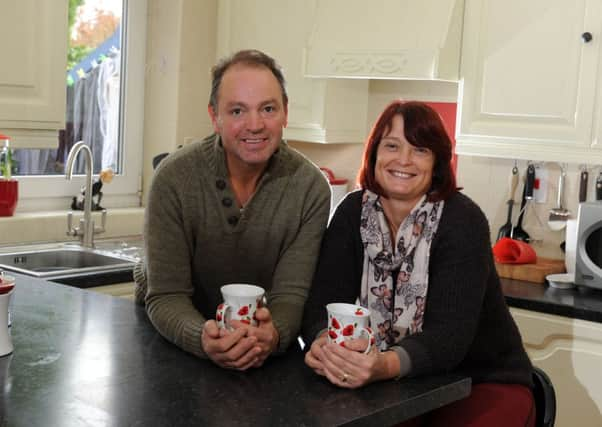Fight to find homes as more children are left crying out for a loving family


Most of us are lucky enough to come from stable family backgrounds, but some children aren’t quite so fortunate.
There are around 90,000 youngsters now in care across the UK, a figure that has risen for the seventh year in a row, and finding loving, secure homes for the record numbers of fostered children has become a top priority.
Advertisement
Hide AdAdvertisement
Hide AdThe rising number of youngsters going into care is a legacy, in part, of the appalling death of Peter Connolly, otherwise known as Baby P, in 2007, whose tragic case became a watershed moment in child protection in the UK.


It’s an issue recognised by the Government which says that children in care in England can now stay with their foster families until their 21st birthday, rather having to leave at 18. Councils have to provide financial support for those who want to stay longer with foster carers and Ministers are pledging £40m over the next three years to fund the plan.
Charities, though, say that more foster carers are needed to provide homes, particularly for teenagers and children with disabilities. They warn that without enough foster families willing and able to offer homes to these groups, some children will find themselves living a long way from family and friends and end up being split up from brothers and sisters, or risk being placed with a foster carer who doesn’t have the skills and experience to meet their needs.
Robert Tapsfield, chief executive of the Fostering Network, says foster carers play a hugely important role. “Young people come into care for a wide range of reasons, but all come needing professional, dedicated and compassionate support. Foster carers are remarkable people who open their homes to some of society’s most vulnerable and disadvantaged children.”
Advertisement
Hide AdAdvertisement
Hide AdHe says fostering services across Yorkshire need to attract a diverse range of carers who can offer as much choice as possible so that they can find the right home for each child, first time. “We urgently need people who believe that they have the right skills and qualities to foster to come forward and make a long lasting positive difference to the life of a child.”
One of the problems is the myths that surround fostering. Unlike adoption, where you become a child’s legal parent, with fostering you’re effectively looking after someone else’s child. It can go from a single night to long-term placements that last for year. Carers also receive a fee for fostering whereas those who adopt children don’t. It’s a complex and emotive issue and quite often children who are fostered still have contact with their birth families, who for whatever reason can’t care for them.
In Yorkshire, more than 5,400 children live with foster families, but more foster carers are needed to replace the 12 per cent who leave each year. Barnardo’s, the UK’s leading children’s charity, is looking to recruit 750 new carers across the county.
It would like to see more people follow in the footsteps of Karen and Robert who have fostered six-year-old Sam, not his real name, for the last 18 months. The couple, from West Yorkshire, have four grown up children aged between 16 and 26 and felt they weren’t ready to give up parenting.
Advertisement
Hide AdAdvertisement
Hide AdBefore they became foster carers Karen had worked with children with autism and Robert had been a police officer. “I had a bit of experience of children in care from the school I worked at and people used to say to me that I’d make a good foster carer,” says Karen. “It wasn’t something I’d really thought about. But then Robert retired and we were on holiday and thinking about what we could do next and he said ‘what about fostering?’”
Karen admits she needed persuading initially. “I was frightened that I couldn’t do it and I would let the child down and not be able to love him, or her, as much as I love my birth children. I didn’t want a child to come into our home and feel different,” she says.
“I love children and I can always find something in a child to love and when we discussed it with our own children they said it was what we do best, that’s our skill – parenting. That was a big boost for me and once we started looking into it I thought ‘I can do this’.”
They contacted their local authority and Barnardo’s and were impressed by the support and empathy the charity offered. “The process to become a foster carer is very deep, you lay your soul bare, but it’s therapeutic in a way. It helps you to understand why you are the person you are today,” Karen explains.
Advertisement
Hide AdAdvertisement
Hide Ad“We came to the conclusion that we wanted a long-term placement and would be happy to have a child with learning or emotional difficulties.”
She says Barnardo’s works hard to make sure the match is right for you and the child. “The support we get from them, and the training, is brilliant. There’s always someone helpful at the end of the phone to give advice or just to talk things through with.”
Barnardo’s has a detailed selection process for foster carers and if someone isn’t suitable they are told early on in the process. Karen and Robert were initially assessed by a social worker and after a six month process were finally approved by the charity’s fostering panel.
A week afterwards Sam, who comes from a difficult background, arrived as an emergency placement. Karen vividly remembers the moment they first met him.
Advertisement
Hide AdAdvertisement
Hide Ad“He was walking down the drive, holding the hand of the social worker, with his teddy bear in his other hand, and he just looked up at us and said ‘Hello, my name’s Sam.’
“Well, it was just magical. I took his hand and led him into the lounge where I’d put some toys out and he just sat and happily played with me,” she says.
However, Sam suffers from attachment disorder, a condition that effects people’s mood and behaviour, and the couple admit there have been times where they’ve struggled.
To begin with it was particularly hard and they had to impose a strict routine from day one. Robert is the main carer and bonded with Sam faster than his wife did.
Advertisement
Hide AdAdvertisement
Hide Ad“It took a bit longer for Karen to bond with him to the point where she felt love for him, but the attachment was there very quickly even though he was very difficult at times.”
The placement kept being extended and 18 months on, Sam is now a big part of Karen and Robert’s family. “He makes us smile every day, he’s naturally really funny, a lovely boy.
“One of the highlights has to be our family holiday last year – all our sons came with their girlfriends and just loved Sam’s company. He brings out the best in everyone.”
They say the good bits outweigh the bad and when they talk about him their faces light up. “I remember when Sam first had two little friends for tea,” says Robert.
Advertisement
Hide AdAdvertisement
Hide Ad“We didn’t know if it was going to work but it was brilliant. We all played in the woods, then when I chatted with the friends over tea, Sam got up and came and sat on my knee and put his arms around me. That really was something, I can’t tell you how it made me feel.”
The couple say there are big challenges in fostering, what they call a kind of “extreme parenting”, but believe that a combination of having firm boundaries and a bit of love can make a huge difference to a young life.
“There’s good in all children, they all have something special. And we just love fostering Sam,” says Karen. “It’s a real honour to be part of his life and if anyone was thinking about fostering I’d say go to Barnardo’s straight away.”
Robert agrees. “You have to appreciate fostering is monumentally hard work, both from a physical and emotional point of view. You have to put your heart and soul into it. But the rewards are immense. It’s the best thing we have ever done.”
Advertisement
Hide AdAdvertisement
Hide AdFor more information about fostering call Barnardo’s on 08000 277 280, or visit www.barnardos.org.uk/fosteringandadoption. You can also log on to couldyoufoster.org.uk
The many faces of foster care
There are different types of foster care placements these include:
Emergency – when children need somewhere safe to stay for a few nights.
Short-term – For a few weeks while plans are made for the child’s future.
Advertisement
Hide AdAdvertisement
Hide AdShort breaks – this is where disabled children, or those with special needs, regularly stay for a while with a family.
Remand – when young people are remanded by a court to be looked after by a specially-trained foster carer.
Long-term – children who go into long-term foster care until they are adults.
Family and friends – A child cared for by the local council goes to live with someone they already know.